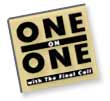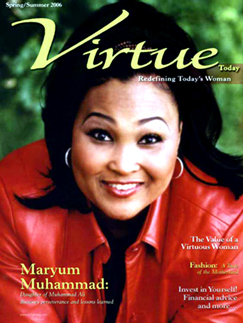FCNNEWSSOURCE

Maryum “May May” Ali was born and raised in Chicago, Ill. After moving to Los Angeles in 1985, she discovered her many talents including acting and comedy. What ties these talents together is her love for writing. In the early 1990s, she wrote rap lyrics for her debut hip hop album, but her real agenda was delivering uplifting lyrics to youth around the world. She took a break from the entertainment business to earn a Bachelor’s Degree in Social Work, graduating with honors, and has used her degree to continue her mission of helping at-risk youth in inner cities.
Presently, Maryum is writing screenplays, television concepts, and has published a children’s book about her father, entitled, “I Shook Up the World: The Incredible Life of Muhammad Ali.” She met Virtue magazine Editor Audrey Muhammad at the Milligan Books annual Black Writer’s Conference in Los Angeles and graciously agreed to an interview.
Virtue Magazine (VM): What do you think of a magazine being named Virtue?
Maryum Ali (MA): I think it is excellent. Women need an alternative magazine to what is out there, something more positive.

VM: Tell us a little about your upbringing.
MA: I wouldn’t change how I grew up for anything. We were taught to love ourselves. Elijah Muhammad named me Maryum. My early exposure to the Nation, from birth to 7 years old, made me understand who I am and how I viewed this country. The Nation helped spark the Civil Rights Movement. The teachings also influenced my father to become a fearless, confident man.
VM: Tell us a little about your work with at-risk youth, Sisters in particular.
MA: I am a social worker for the LA Bridges Program in South Los Angeles. LA Bridges is a delinquency prevention program. We offer free services to help guide youth away from crime; trying to help them understand that no matter what has happened in their past, no one can take their minds away from them. Many of them end up dropping out of high school because they didn’t take middle school seriously. Most of the time, the biggest problem with the children I work with comes from a dysfunctional home environment.
VM: What types of things did your mother teach you while growing up?
MA: To be honest, my grandmother raised me. She taught me how to be a good judge of character. I remember when I was 10 years old my grandmother told me to watch myself around a particular female friend. She said, “That girl is jealous of you.” At first, I didn’t believe her, but I came to realize that my grandmother was always right about everybody. Being around my Dad also made me a good judge of character, because I would observe the many different individuals that would try to hang around him.
VM: What principles do you think are important to teach young women?
MA: The name of your magazine, virtue, is important. A woman should have the utmost respect for herself. Young women need to learn self-control, especially when it comes to men. Making the wrong relationship decisions can chip away at a woman’s self-esteem. Women need to really understand who they are first, so they are not defined only by their mate. When you respect who you are, you will immediately recognize a man that is not respecting you. It’s also important for women to surround themselves with progressive and positive thinkers. Get all negativity out of your life.
VM: Your father is someone who is known for standing up for what he believes in and is willing to speak up for humanity. What qualities do you most admire about your father? What impact did your father’s beliefs have on your life?
MA: I admire his faith and confidence the most. People who are deeply rooted in faith are extremely confident. He taught me to never give up on the goals I want to achieve. I also try to model the discipline my father had.
VM: What is your view on how women are viewed today on TV and in music videos? How did you guard yourself from that influence?
MA: Unfortunately, we are mostly portrayed as sexual objects. My religion, Al Islam, has prevented me from falling into the traps that are planted for women.
VM: What did you think of the Million Man March and the Millions More Movement?
MA: It’s a great event, and hopefully the spirit of the event will infiltrate into American families and communities. African Americans need to take ownership in what happens in their lives, because, as history has proven, nothing will be given to us. It all has to start with the family unit.
VM: What is your vision for your future? Your career?
MA: I want to write for TV and film, because the African American perspective is greatly needed. But most importantly, I’m always striving to live right; to be the best person I can be.
VM: Thank you.
(For more information, visit http://www.virtuemag.com/.)












